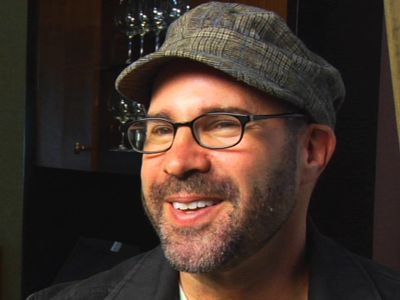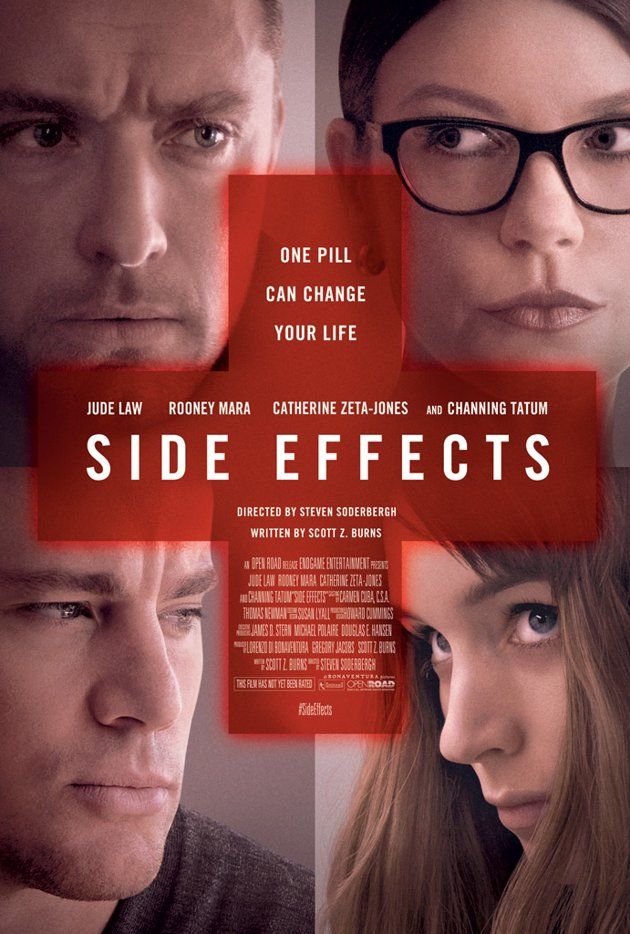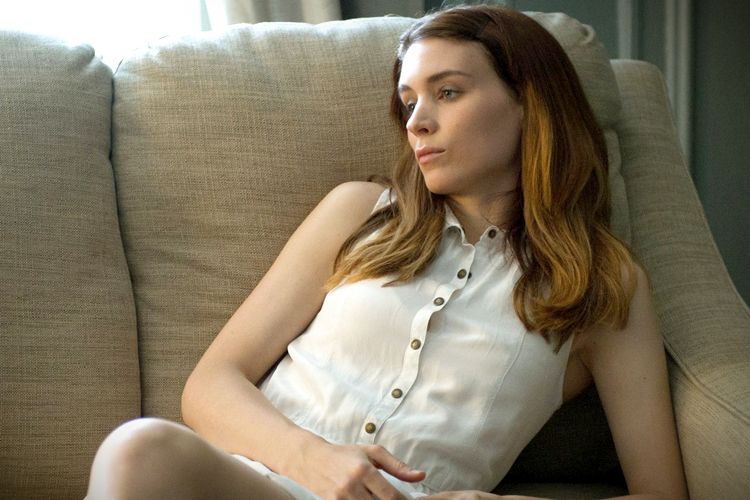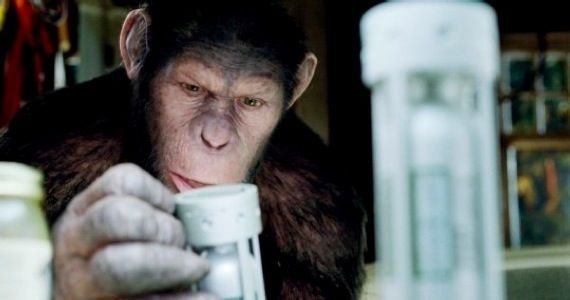It’s pretty good to be Scott Z. Burns. The screenwriter penned The Bourne Ultimatum, The Informant! and Contagion, and he continues his long-standing relationship with director Steven Soderbergh with the psychological thriller Side Effects. What’s more, he was the first to take a stab at next year’s Dawn of the Planet of the Apes.
Opening Friday, Side Effects follows Emily Taylor (Rooney Mara), a depressed woman who seeks the help of psychiatrist Dr. Jonathan Banks (Jude Law) only to find her life turned upside down by an experimental drug he prescribes to her. As the psychological thriller unravels, the lines between reality, morality and accountability are blurred.
Burns recently sat down with Spinoff Online in New York City for a lengthy chat about his friendship with Soderbergh (and the legacy the retiring director is leaving behind), the themes behind Side Effects, his direction for the Apes sequel and the origins of that “Blogging isn’t writing” line from Contagion.
It was fun to see you and Steven together at the FilmLinc Q&A the other night. You guys have a very brotherly dynamic.
It's sort of sometimes the only time we do talk about what we did. The concerns of it while you're in it are so different, or just the things we like to talk about. Steven and I spend a lot of time talking about baseball.
You've worked with him enough at this point, it'd be strange to me if you didn't have a personal relationship.
Yeah, five times. It's very flattering that he's kept me around. Especially when you look at the other people who he's worked with -- we actually are kinda friends with each other, like [Brian] Koppleman and [David] Levien and I. I love those guys. Scott Frank is just a wonderful guy. One of the great legacies that I don't think people realize that Steven is leaving is that all of us know each other and kind of take an interest in each other's work and really, it's great when somebody like Scott Frank or Tony Gilroy writes you an email and says that they recognize your work. And I know all of those people because of Steven.
Speaking of people you work with often, I honestly expected Matt Damon to show up in Side Effects. Did he have a scene that hit the cutting-room floor?
It's so funny that you said that, because I had a friends and family screening in L.A., and when I was introducing the movie I thanked Matt Damon. I'm like, "He's not even in the movie, but I kind of feel like I should always say thank you."
He seems like the nicest guy in the world. I've seen him at press events and he's just so polite and genuine.
I think he actually may be the nicest guy in the world. He's just always awesome.
Is that why you kept writing him into movies?
You know, he is the only actor whose voice I think I have had in my head at times. For a while I thought about him for this [Jude Law's] role. Because over the last seven or eight years that I've been writing this -- nine years, to be honest -- there were times, because I knew Matt, that I thought how interesting it would be to see him, and I like Matt as an actor when he's struggling and losing it, which is why I think Jason Bourne is such a great character. The amazing thing about Jude that Steven and I learned through doing Contagion is that what's so cool and together about Jude, he's very willing to give up as an actor. And that's why I think Jonathan Banks [Jude’s character] works really well.
I love Jude. He's been in so many movies of varying caliber, and he's always, always good. Excellent, really.
Right? I mean, tell me the bad Jude Law performance. Because I don't remember there being one! And from the standpoint of a writer -- I remember when we were doing Contagion, and he had these big, long monologues, and beforehand I said to him … and this is a sort of unusual thing, most of the time a writer wouldn't even be able to have this sort of conversation with an actor, but Steven allows me to do it. I said to him, "If you get going and you just leave out a block, I'm more interested in these being rants than in you hitting every word."
That's pretty egoless of you. Because the words he's speaking are your blood, sweat and tears.
Well, I just wanted the impression of this guy to be someone who just went off. And Jude looked at me and he goes, "No, I'm going to get every word." And he would know at the end of a take, he'd look at me off-camera and go, "I inverted something, didn't I?" And I'm like, "I don't even know!"
So he's a purist!
Yeah, well you do Hamlet for a few years …
Have you seen him in Anna Karenina, by the way? Holy cow, what a performance.
I haven't seen Anna Karenina yet but I hear it's really amazing what he does! He's completely fearless. It's funny, because when we were doing Contagion, we shot Kate Winslet's part first, and Kate and Jude are friends. And I loved working with Kate; she and I sort of approach things in the exact same way, where she wants to know everything. And that's how she does what she does -- she totally immerses, wants to know everything, and approaches it like an anthropologist almost. And I remember when she was leaving, she said, "You will love Jude Law -- he is going to be exactly what you like in an actor."
It sounds like you're on set a lot, which I'm presuming is quite rare for a writer.
[laughs] Yeah. I remember on The Informant!, I thought I was there just sort of as a courtesy. I wasn't really sure what I was supposed to be doing there, and I think on the second day I kind of felt like, “I should go home, this is sort of silly.” And then Matt [Damon] asked me a question about a scene, and we had this really wonderful long talk about the scene, and we were walking up to set, and all of a sudden I thought, “Oh, I totally went to a place I shouldn't go to.” And I said to Steven, {Matt asked me a question and we had this long talk, so if I took it in the wrong way, I'm really, really sorry -- I should've asked you first.” And he said, "No, that's why you're here! You're here because you know the story better than any of us … you're here for everything that you couldn't put on the page, and I need you here to answer the questions." And I've been there every shoot day since.
Rooney is so incredible in Side Effects. It's a very layered performance.
Yeah! It's funny, because I knew her sister [Kate Mara] socially in L.A. … and so I thought Rooney would be like Kate. I don't know why, because siblings are very different. And it's sort of fascinating because Kate makes you lean back and relax when you meet her - Rooney is one of these human beings who is so inscrutable that you just are leaning forward the whole time because you want to figure out what is going on with this person, and eventually you lean forward far enough and you kind of lose your balance around her. The first time she came over to my house, when Steven was there, and we had this meeting to decide we were going to do this together, when she left I was like, “That's perfect.”
It's hard to find a part like this one, which allows for a really incredible performance. Really interesting, layered leading roles for women are so rare.
A few years ago I worked on a TV project with Angelina Jolie -- that never got made -- but I was writing the script and I finished it while I was working with Angie, and I gave it to her, and she said, "I would love to do this, but people would know the whole story, if it was me, by page five." But then she said something really interesting, she said, "I really hope one of these young actresses will do this and not be precious."
Well, that wish certainly came true.
It's funny, all the early movies that I wrote were populated by different versions of men -- maybe different versions of me. But now, maybe it's because I'm trying really hard to understand women, but it's really fun to write them and sort of think about their motivations.
Spoken like the child of two psychologists.
[laughs] Yeah!
It does seem interesting that you wrote a film about their industry. Is there some wish fulfillment involved here? Or did you have a bad experience with meds?
I have dealt with depression, I've never taken meds. I've had people around me who have, so I've sort of seen that struggle. I was always really curious about it, about what the experience is of having an awareness that your mood is being changed from within rather than by external events. But in the beginning this was less about my parents and more about -- I worked on a TV show Peter Berg created called Wonderland, and we all went to Bellevue to do research.
Even though your parents can't prescribe drugs, did you consult with them about any of your work on Side Effects?
No. What use are they? [laughs] And the last thing I want to do is talk to my parents about work! But I went to Bellevue and I just thought it was one of the most amazing places I'd ever been, because it poses the most fascinating ethical, philosophical questions every day. There are people who've done things that are against the law, and you have to figure out: did they do these things because they're sick or because they're evil? And if someone doesn't know what they're doing, is that a crime? And so you have that sort of ethical issue, and then you have all these drugs that you can layer on top of it, and it was at that intersection that I thought, “There's got to be a cool story to tell, here.”
This movie is incredibly tense -- it's a build-up with multiple twists. What’s your approach to writing tension?
My instinct always in writing is to get into a scene as late as possible and get out as early as possible. In this movie, that's even more important because you've got to stay ahead of the audience. And so I think my job as a writer was just to try and stay ahead of the audience and to fill the thing up with a certain amount of red herrings and a certain amount of actual fish.
What's kind of weird is that I pretty much trusted Jude Law's word implicitly throughout this film, even when he went off the rails.
He totally goes off the rails! I always wanted it to be sort of this Russian conceit: For him to catch the devil he has to become the devil.
Was it intentional that we never see Jude's character taking medication, yet he has no problem prescribing them to his patients and even his wife?
There were earlier versions where he was. My hope was always that everybody in the movie …
… was medicated? That's creepy, that's Twilight Zone stuff.
Well, that's sort of what drew me to this: How do we exist in a world where you never know what's going on? You never know what influence somebody is under. I mean, the first few meetings I ever had with Steven, I was super-nervous. And I took beta blockers, because I wanted to be present and relaxed.
I really want to talk about Dawn of the Planet of the Apes, although right before we spoke I overheard you mention you were only involved as far as the first draft.
Yeah, I wish I could say more about it! I was really excited because I liked where they left the last one, and because they left the last one with a virus breaking out, I had all of this sort of extra Contagion stuff to say. And so it was a really exciting place to pick up. And Rupert [Wyatt] and I had a really shared vision about where the apes were going to go and what was going to happen to them and who the new humans were going to be. And it was a major bummer.
What happened?
Rupert and the studio sort of parted ways, and when they brought in a new director - you know, frequently the new director wants a new writer. Rick [Jaffa] and Amanda [Silver] I think are probably back on it, because they're producers and they had written the last one.
Do you think any part of your version will remain?
Who knows!
Well, we're going to talk wish fulfillment anyway.
[laughs] OK!
I love that you mentioned the virus connection, because it just makes so much sense to have you write it. Where in this film are we with that -- has it already decimated humanity or is it still on its way?
I can't tell you that! [laughs]
There are a lot of people hoping for some kind of Che Guevara reference - even just Caesar in Che's hat.
Oh, that's funny. Well, Caesar - what Rupert and I did explore is when, as the apes progress, they go through some of the basic battles and crises about leadership … and I think what we wanted to do is explore coexistence versus conflict.
I think there's a lot to be explored when it comes to themes of terrorism and revolution.
Yep! All that stuff! That's what Rupert and I wanted to get into. And I hope that they stay on that.
What about the evolutionary process by which the apes begin to speak?
I did start doing research on how language is built. And so I started to have conversations -- if I continued, I was gonna start trying to have Steven Pinker at Harvard, who's written a lot about language and thought, to explore how those two things influence each other. Do we have thoughts before we have language? That was what I wanted to get into … as the apes were developing, what thoughts produce what kind of language.
I'll kick myself if I don't ask you this last thing: regarding the "Blogging isn't writing. It's graffiti with punctuation" line in Contagion. What was the motivation? Did a blogger piss you off?
You know what, it's so funny, it was actually a comment that I think Carl Bernstein, the journalist, made to me at one point. Where we were talking about unfiltered content, and how on one hand the Internet is this amazing thing because there's so much information, and it's so open and so democratic. And on the other hand, there is so much misinformation.
It’s certainly tough when writing is your profession and you’re living in a world where anyone with Internet access can purport to be a writer.
It really is about, do you find yourself way up there in the corner looking down on a situation? Because I think that's where the beginning of writing is, it's way up in that corner.




